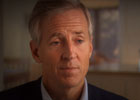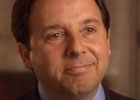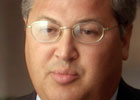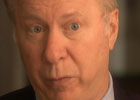Assessments of whether the Bush White House's battles to expand presidential power will have left the presidency more powerful than it was in 2000.
- Jack Goldsmith
- Charlie Savage
- Evan Thomas
- Ron Suskind
- Bradford Berenson
- David Gergen
- Related Links
- Cheney's View of the World
The politics and psychology that have shaped Dick Cheney's belief that America needs a powerful, virtually unfettered presidency. - True Believers
What drives Bush and Cheney's views on executive power?
Jack Goldsmith
Assistant attorney general, Office of Legal Counsel, 2003-'04
[What's been the Supreme Court's reaction to the administration's policies?]
The Supreme Court has been very skeptical about the Bush administration's legal arguments on the war on terrorism. The Supreme Court has not, however, put a whole lot of restrictions yet on what the president can do. A lot of what the Supreme Court has been doing in its first few decisions -- Hamdi [v. Rumsfeld], Hamdan [v. Rusmfeld], Rasul [v. Bush] -- has basically been saying: "We are not going to allow you to proceed on the war on terrorism without judicial supervision. We're not yet going to tell you exactly what norms are required in the war on terrorism. We hope that you go to Congress and get this thing on a firmer legal foundation so that we don't have to answer these questions." That's basically all the court has done so far.
The two biggest blows were the Rasul case, where the court said that it had jurisdiction over Guantanamo, and especially the Hamdan case, which declared unlawful the military commissions, and more importantly declared that a small part of the Geneva Convention governs the war on terrorism.
But the president was able to go back that summer, that fall, after the Supreme Court's decision and get a lot of what he'd been doing, and in some respects more from Congress, which is remarkable for a lot of reasons.
Is that a speed bump to [vice presidential aide David] Addington, Cheney and the forces of executive power, or was it more than that?
On the one hand, these have been losses in the Supreme Court, and they're losses that are precedents that add up, that are restrictions on presidential power.
On the other hand, I don't think the administration has actually been stopped from doing much at all of what it's wanted to do since 9/11. In terms of what they're actually doing, the combination of the congressional restrictions that have grown up and the Supreme Court restrictions to date have at best put very modest limitations on what they wanted to do.
So you might think that the go-it-alone strategy of pushing as hard as they could for executive prerogative, going to Congress only when necessary, has in some sense paid off, because they're still able to do what they want to do, and as we speak there's been no attack since 9/11. That's likely in the White House viewed as an enormous success.
But there have also been losses to the presidency and to the power of future presidents. There's no doubt that Congress and the courts are more suspicious and less trustful of the president and the presidency now than they were after 9/11 and that this suspicion of the president will harm future presidencies. I have no doubt about that.
So in some important sense the White House has not, I think, left the presidency as powerful as it was in 2001 or 2000. ...
Charlie Savage
Author, Takeover: The Return of the Imperial Presidency and the Subversion of American Democracy
Over the last 50 years, as the Cold War created the original imperial presidency, which has sort of grown in fits and starts, there have been periods of waxing and periods of waning. What happens is you get executive branch officials who believe in maximal presidential power who make increasingly aggressive claims and take increasingly aggressive actions. Then inevitably that leads to some kind of abuse that comes to light and creates a backlash. ... Then a few years pass, and then this sort of starts up again. But it never rolls back to where it had been at the beginning. It ratchets forward, very quickly picking up from where it was left off before. ...
This administration is going to be gone, starting in 2009. But the historical record of what it's done … in which it's taken actions based on its very aggressive, previously marginal theories about a president's ability to circumvent checks and balances, to act in defiance of laws and treaties and so forth -- by taking actions based on these theories, it's converted the theory into historical facts which future presidents, Democrats and Republicans alike, will be able to cite when they also want to take actions that seem to be prohibited by laws and treaties in order to impose their own agenda on the country and world, whatever that agenda may be.
What this administration has achieved, regardless of these short-term fights that we're going to see in this last year with the Congress, is very likely a highly successful, permanent, long-term expansion of the institutional powers of the presidency and a retilting of the balance of power toward the White House, in Washington, for the future. ...

The long-lasting effects of quest for executive power, who wins? Who loses?
There's a profound irony here. Nobody has done more to give power to the executive branch or tried to do more than Dick Cheney. I mean, he's made it a state religion. The perverse outcome may be to undermine the executive branch. They may have overreached. The pendulum always swings too far in democracies. You could say that in Watergate, we went too far the other way, that we gave Congress too much power and stripped the executive branch of power. But now with Cheney's really aggressive assertion of power after 9/11, he may have overdone it. And it may be that the courts and Congress come back and chip away at executive branch power and overdo it. We may be back the way we were after Watergate of overcorrecting for a problem. It's difficult to get the balance right.
And after all, the Constitution respects some tension. There's supposed to be some tension between the branches of government, separation of powers. It's the whole idea of a government where you do separate power. But it's a difficult balance to get exactly right. And it's pretty clear that Cheney and his minions went too far and we may now see a period where the pendulum swings back too far the other way.
Ron Suskind
Author, The One Percent Doctrine

The bottom line is that executive power has been dramatically expanded with actions, actions that sometimes get pushed back but ultimately they crop up again. And that's part of the legacy of these years. We are at a crossroads moment in America where we are trying to figure out how we do what we do to stay who we are. That's a battle that will continue to rage.
The legacy of this administration will certainly be the kind of innovation as to the use of power, the use of power in places it hadn't been used as such before. … That debate in many ways may intensify as we go forward.
Bradford Berenson
Associate White House counsel, 2001-'03
After all this is over, your overview of this question of executive power? ... How do you look at it now? ...
I remain as convinced as ever in the importance of a vigorous executive, particularly for protecting the country against foreign attack and safeguarding our interests abroad, both with allies and adversaries. I think the executive is just institutionally much better suited to handle our external relations than the Congress is, and the framers of the Constitution were very clear that they understood it the same way. So I have undiminished enthusiasm for the importance of protecting the powers of the presidency for all occupants of that office now and in the future, Republican and Democrat.
The wisdom I think I've gained through the past few years is that while vigorously protecting all of those powers and prerogatives, one doesn't have to always use them. That is, sometimes discretion is the better part of valor, and there are circumstances where even though it is possible to do something constitutionally under Article II, as a matter of practical wisdom, as a matter of policy, it may be better not to. ...
David Gergen
Adviser to Presidents Nixon, Ford, Reagan and Clinton
There is such a thing as executive privilege. I don't think everything should be open to the Congress or to the press. And you do need to protect that in order to have a good working White House. You do need to have the capacity to intercept terrorist e-mails or telephone conversations. All of those are quite legitimate concerns. The question is whether you observe the right administrative processes and whether you observe the right kind of standards in the way you go after them. And that's what I think the argument is about -- not whether some of these underlying concerns are illegitimate. I think they're quite legitimate.
It's process?
It's process. It's a lot about how a democracy works. And it's about a political culture. It's not just about the laws; it's also about whether you've got a healthy political culture.
home . introduction . watch online . interviews . themes . join the discussion
producer's chat . readings & links . site map . dvd & transcript . press reaction
teacher's guide . credits . privacy policy . journalistic guidelines . FRONTLINE series home . wgbh . pbs
posted october 16, 2007
FRONTLINE is a registered trademark of wgbh educational foundation.
main photograph © corbis, all rights reserved
web site copyright WGBH educational foundation



